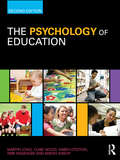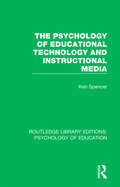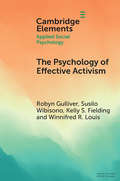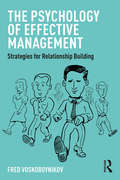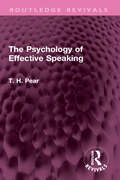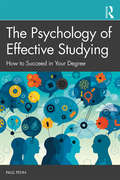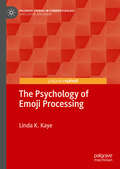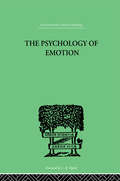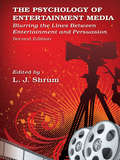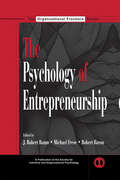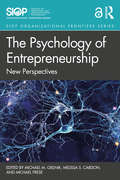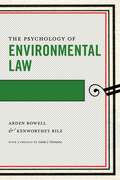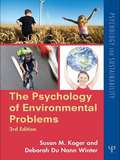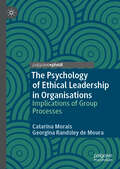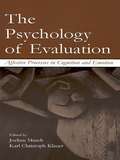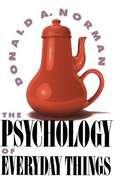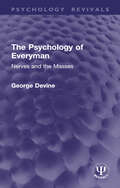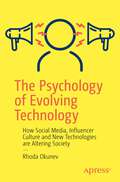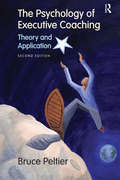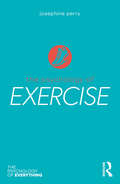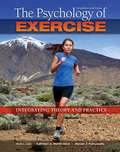- Table View
- List View
The Psychology of Education
by Kieron Sheehy Martyn Long Clare Wood Karen Littleton Terri PassengerWritten in an accessible and engaging style, this second edition of The Psychology of Education addresses key concepts from psychology which relate to education. Throughout the text the author team emphasise an evidence-based approach, providing practical suggestions to improve learning outcomes, while fictional case studies are used in this new edition to provide students with a sense of what psychological issues can look like in the classroom. Activities around these case studies give students the chance to think about how to apply their theoretical knowledge to these real-world contexts. ‘Key implications’ are drawn out at appropriate points, and throughout the book students are provided with strategies for interrogating evidence. Key terms are glossed throughout the book and chapters are summarised and followed by suggestions for further reading. A chapter on Learning interactions and social worlds is new to this edition. The following chapters have all been extensively updated: Learning Assessment Individual differences and achievement Student engagement and motivation The educational context Society and culture Language Literacy Inclusive education and special educational needs Behaviour problems Dealing with behaviour problems. This book is essential reading for undergraduate students of Education Studies and Psychology as well as trainee teachers on BA, BEd and PGCE courses. It will also be of use to postgraduates training to be educational psychologists.
The Psychology of Educational Technology and Instructional Media (Routledge Library Editions: Psychology of Education)
by Ken SpencerWhat can research in cognitive psychology offer the growth of educational technology and instructional media? Originally published in 1988, this book argues that, for much of its history, educational technology has been concerned with justifying and verifying the basic assumption that the processes and products of technology can improve instructional effectiveness. The result is seen as a systems approach grounded in empiricism and the failure to incorporate much important research in cognitive psychology. The book argues that it is now time for educational technology to come to terms with new ideas in cognitive, and particularly constructivist, psychology and it both advocates and describes the forging of new links between the two disciplines.
The Psychology of Effective Activism (Elements in Applied Social Psychology)
by Robyn Gulliver Susilo Wibisono Kelly S. Fielding Winnifred R. LouisThis Element reviews the social psychology of effective collective action, highlighting the importance of considering activists' goals, timeframes, and psychological perspectives in seeking to conceptualise this construct. A novel framework 'ABIASCA' maps effectiveness in relation to activists' goals for mobilisation and change (Awareness raising; Building sympathy; turning sympathy into Intentions; turning intentions into Actions; Sustaining groups over time; Coalition-building; and Avoiding opponents' counter-mobilisation). We also review the DIME model of Disidentification, Innovation, Moralization and Energization, which examines the effects of failure in creating trajectories of activists' disidentification from collective action; innovation (including to radicalisation or deradicalisation); and increased moral conviction and energy. The social psychological drivers of effective collective action for four audiences are examined in detail, in four sections: for the self and supporters, bystanders, opponents, and for third parties. We conclude by highlighting an agenda for future research, and drawing out key messages for scholars.
The Psychology of Effective Management: Strategies for Relationship Building
by Fred VoskoboynikovThe Psychology of Effective Management combines basic psychological principles with practical recommendations for building positive and productive manager-employee relations. Each recommendation is based on real-life situations taken from respected scholars in the field, as well as the author’s own professional experiences. With particular attention to the human element of management, the practical advice presented in this book is aimed at helping managers create a positive psychological environment in the workplace and lead their employees into a productive and satisfying professional life. The content is presented in an easy-to-follow format so that any manager can put his or her knowledge immediately into practice. By striking a compelling balance between the science and practice of management, this will be an indispensable resource for managers, administrators, and business owners at all levels as well as students of business and management.
The Psychology of Effective Speaking (Routledge Revivals)
by T. H. PearFirst published in 1933, The Psychology of Effective Speaking studies voice as an expression of personality. This book also criticises the education of its time, but not always destructively. It asks why, since people speak, they should not speak better. It suggests that if democracy is to succeed, rapid increase in the effectiveness of vocal communication is urgently necessary, and that this improvement begin in the lower classes of the schools. This book will be of interest to students of rhetoric, communication and psychology.
The Psychology of Effective Studying: How to Succeed in Your Degree
by Paul PennThis book provides a vital guide for students to key study skills that are instrumental in success at university, covering time management, academic reading and note-taking, academic integrity, preparation of written assignments, teamwork and presentations. With each chapter consisting of sub-sections that are titled with a single piece of fundamental advice, this is the perfect ‘hit the ground running’ resource for students embarking on their undergraduate studies. The book uses evidence from psychology to account for the basic errors that students make when studying, illuminating how they can be addressed simply and effectively. Creating an ‘insider’s guide’ to the core requisite skills of studying at degree level, and using a combination of research and practical examples, the author conveys where students often go fundamentally wrong in their studying practices and provides clear and concise advice on how they can improve. Written in a humorous and irreverent tone, and including illustrations and examples from popular culture, this is the ideal alternative and accessible study skills resource for students at undergraduate level, as well as any reader interested in how to learn more effectively.
The Psychology of Embezzlement: The Art of Control and Intervention
by David CurnowUsing recent research and case studies, this book offers an evidence-based insight into the embezzler’s mindset as they commit crimes that are costing nations, organisations and individuals increasingly more each year. This mindset is described in detail as the embezzler develops their motivation to steal from their employer, finds a method of stealing, assesses the risks, executes the theft, and then determines whether to continue to steal. The organisational landscape of security capabilities, culture and financial circumstances provide the environment that this mindset operates within. The embezzler’s approach to the crime is broken down into four stages: Pre-Existing Vulnerabilities, Induction to First Theft, Ongoing Theft and Detection to Resolution. The author recommends strategies based on the embezzler’s mindset for organisations to enhance their ability to protect themselves from such inside threats that attack their reputation, productivity, morale and, in the worst cases, financial viability.
The Psychology of Emoji Processing (Palgrave Studies in Cyberpsychology)
by Linda K. KayeThis book draws together the scientific research on how we process and interpret emoji. Most books on the subject of emoji explain how we use emoji and the functions they serve for the sender, but very do very little to address the receiver’s perspective. Seeking to redress this, this book extracts insights from a range of psychology sub-disciplines to provide a comprehensive review of current research on how we process emoji. The book also includes recommended theoretical frameworks and methodologies to help researchers in this area to strengthen their research, as a way of helping advance the research field on this fascinating topic.
The Psychology of Emotion: Morbid and Normal (International Library Of Psychology)
by MacCurdy, John TThis is Volume XII of nineteen in a collection of Abnormal and Clinical Psychology. Originally published in 1925, this research stemmed from many discussions about the applicability of psychoanalytic principles to manic-depressive insanity, whether the symptoms could be traced to unconscious mental processes in the same way as Jung had demonstrated it to be possible in dementia praecox and ended up with the general objective moving from that of psychopathological to one of psychological conclusions .
The Psychology of Emotions and Humour in Buddhism
by Padmasiri De SilvaThis book examines the psychological dimensions of emotions and humour in Buddhism. While there is a wealth of material concerning human emotions related to humour and the mindful management of negative emotions, very little has been written on the theory of Buddhist humour. Uniting both Buddhist and Western philosophy, the author draws upon the theory of ‘incongruity humour’, espoused by figures such as Kierkegaard, Kant and Hegel and absorbed into the interpretation of humour by the Buddhist monk and former Western philosopher, Ñāṇavīra Thero. The author makes extensive use of rich primary sources such as the parables used by Ajahn Brahm while interweaving Western theories and philosophies to illuminate this original study of humour and emotion. This pioneering work will be of interest and value to students and scholars of humour, Buddhist traditions and existentialism more widely.
The Psychology of Entertainment Media: Blurring the Lines Between Entertainment and Persuasion
by L. J. ShrumIn this volume, psychologists and communication experts present theory on understanding and predicting how learning occurs through media consumption. As the impact of traditional advertising has declined over the last couple of decades, marketers have scrambled to find other ways to effectively communicate with consumers. Among other approaches, marketers have utilized various forms of product integration. Product integration is mixing a commercial message in with the non-commercial message via TV, movie, video, and other entertainment venues. This book will be of interest to students and researchers in psychology, marketing, communication, advertising, and consumer behavior.
The Psychology of Entrepreneurship: A Special Issue Of The European Journal Of Work And Organizational Psychology (SIOP Organizational Frontiers Series)
by Robert A. Baron Michael Frese J. Robert BaumEntrepreneurship is essential for international social and economic well-being, as new ventures are the dominant source of job creation, market innovation, and economic growth in many societies. In this book, a noted group of researchers use findings, methods, and theories of modern psychology as the basis for gaining important, new insights into entrepreneurship-and into the hearts and minds of the talented, passionate professionals who create new business ventures. The Psychology of Entrepreneurship, a volume in the SIOP Organizational Frontiers Series, is the first book written about the psychology of entrepreneurship, and includes over 60 research questions to guide industrial organizational psychology, organizational behavior, and entrepreneurship research about entrepreneurs. It seeks to answer questions such as, how and why do some people, but not others, recognize opportunities, decide to start new ventures, and organize successful, rapidly growing new ventures? Some topics addressed include: methods to help researchers explore the domain of entrepreneurship research; the entire process of starting a new business; characteristics of the individual entrepreneur; the history of entrepreneurship education; the cross-cultural effects of entrepreneurship; and the viewpoints of seasoned psychologists who analyze current entrepreneurship research methods. This book will appeal to teachers, students, and researchers in the areas of industrial organizational psychology, organizational behavior, entrepreneurship, and management.
The Psychology of Entrepreneurship: New Perspectives (SIOP Organizational Frontiers Series)
by Michael M. GielnikThe Psychology of Entrepreneurship: New Perspectives is an update of the earlier landmark volume in the Society for Industrial and Organizational Psychology Organizational Frontiers Series. This new book takes stock of the advances in the field of the psychology of entrepreneurship with all new chapters and presents the latest findings on traditional topics, such as cognition, motivation, affect, personality, and action. The Psychology of Entrepreneurship: New Perspectives compiles research of the most prolific scholars in the field to produce an overview of the most important psychological topics relevant to entrepreneurship. It includes novel insights into topics such as entrepreneurial cognition, intrapreneurship and innovation, leadership, entrepreneurial competencies, action theory, entrepreneurship training, and the process of entrepreneurship. Additionally, the updated volume presents new topics that have become more and more important in entrepreneurship research. These topics include affect, clinical psychology and disorders, biological correlates of entrepreneurship, entrepreneurial teams, culture, identity, starting capital, failure and exit, contextual factors, age and demographic change, evidence-based entrepreneurship, and entrepreneurs’ well-being. With a collection of authors comprising experts who have developed the field over the last decade, The Psychology of Entrepreneurship: New Perspectives is vital to all students, scholars, and instructors interested in staying abreast of the most current, novel research and insights into the psychology of entrepreneurship.
The Psychology of Environmental Law (Psychology and the Law)
by Arden Rowell Kenworthey Bilz Linda J DemaineOffers psychological insights into how people perceive, respond to, value, and make decisions about the environmentEnvironmental law may seem a strange space to seek insights from psychology. Psychology, after all, seeks to illuminate the interior of the human mind, while environmental law is fundamentally concerned with the exterior surroundings—the environment—in which people live.Yet psychology is a crucial, undervalued factor in how laws shape people’s interactions with the environment. Psychology can offer environmental law a rich, empirically informed account of why, when, and how people act in ways that affect the environment—which can then be used to more effectively pursue specific policy goals. When environmental law fails to incorporate insights from psychology, it risks misunderstanding and mispredicting human behaviors that may injure or otherwise affect the environment, and misprescribing legal tools to shape or mitigate those behaviors.The Psychology of Environmental Law provides key insights regarding how psychology can inform, explain, and improve how environmental law operates. It offers concrete analyses of the theoretical and practical payoffs in pollution control, ecosystem management, and climate change law and policy when psychological insights are taken into account.
The Psychology of Environmental Problems
by Susan M. Koger Deborah Dunann WinterThis compelling and insightful textbook demonstrates how eight major approaches in psychology - social, psychoanalytical, behavioral, cognitive, physiological, health, developmental, and holistic - can be applied to create a more sustainable society. After outlining current environmental difficulties and historical antecedents, these various perspectives offer guidance for changing individual and collective behavior. This 3rd edition is thoroughly revised and updated throughout, and features new chapters on the neuropsychology of toxic exposures, health and the psychology of environmental stress, and developmental psychology. It offers a comprehensive review of literature in various subdisciplines, demonstrating the wide applicability and relevance of psychology for addressing imminent environmental threats. Like both previous editions, the book's tone is widely accessible and engaging -- and no previous background in psychology or environmental science is assumed or required. The use of personal examples and cartoons help engage the reader. The 3rd edition is also accompanied by online resources for instructors. The Psychology of Environmental Problems: Psychology for Sustainability, 3rd Edition can be used as a primary or secondary textbook on a wide range of courses in Ecological Psychology, Environmental Science, Sustainability Sciences, Environmental Education, and Social Marketing. It also provides a valuable resource for professional audience of policymakers, legislators, and those working on sustainable communities.
The Psychology of Ethical Leadership in Organisations
by Catarina Morais Georgina Randsley de MouraUnderstanding the effects of and psychology behind ethical and unethical leadership decisions can have a lasting and far reaching effect on any working environment. This book utilizes social identity theory and applied research to discuss the implications and applications of ethical and unethical leadership to work groups and organisations. The authors argue that improving ethicality results in healthier and more productive relationships between leaders and employees, and between employees and the organisation, which can impact positively on the success of the organisation as a whole.The book explores the benefits of ethical leadership and how to deal with unethical leaders, as well as how and why teams react to different types of leadership. The concluding chapter suggests several strategies for interventions that organisations can adopt to improve their ethical leadership frameworks. The book is essential reading for academics and professionals involved in workplace psychology and ethics as well as anyone interested in learning about the effects of ethics on leadership.
The Psychology of Evaluation: Affective Processes in Cognition and Emotion
by Jochen Musch Karl Christoph KlauerThe affective connotations of environmental stimuli are evaluated spontaneously and with minimal cognitive processing. The activated evaluations influence subsequent emotional and cognitive processes. Featuring original contributions from leading researchers active in this area, this book reviews and integrates the most recent research and theories on this exciting new topic. Many fundamental issues regarding the nature of and relationship between evaluations, cognition, and emotion are covered. The chapters explore the mechanisms and boundary conditions of automatic evaluative processes, the determinants of valence, indirect measures of individual differences in the evaluation of social stimuli, and the relationship between evaluations and mood, as well as emotion and behavior. Offering a highly integrated and comprehensive coverage of the field, this book is suitable as a core textbook in advanced courses dealing with the role of evaluations in cognition and emotion.
The Psychology of Everyday Life (Psychology Revivals)
by James DreverFirst published in 1921, The Psychology of Everyday Life covers the major portion of the field known as modern psychology. In this work the author has attempted to give such knowledge of modern psychology to enable the person in the street to take an intelligent interest in the psychological problems and discussions of the day. Today it can be read in its historical context.This book is a re-issue originally published in 1921. The language used is a reflection of its era and no offence is meant by the Publishers to any reader by this re-publication.
The Psychology of Everyday Things
by Donald A. NormanEven the smartest among us can feel inept as we fail to figure our which light switch or oven burner to turn on, or whether to push, pull, or slide a door. The fault, argues this fascinating, ingenious—even liberating—book, lies not in ourselves, but in product design that ignores the needs of users and the principles of cognitive psychology. The problems range from ambiguous and hidden controls to arbitrary relationships between controls and functions, coupled with a lack of feedback or other assistance and unreasonable demands on memorization. The book presents examples aplenty—among them, the VCR, computer, and office telephone, all models of how not to design for people.But good, usable design is possible. The rules are simple: make things visible, exploit natural relationships that couple function and control, and make intelligent use of constraints. The goal: guide the user effortlessly to the right action on the right control at the right time. But the designer must care.
The Psychology of Everyman: Nerves and the Masses (Psychology Revivals)
by George DevineFirst published in 1935, The Psychology of Everyman: Nerves and the Masses was written as a short and simple treatise on ‘Functional Nerve Disease’ for doctors in general practice. The main object of the book was to enable the busy Practitioner to recognise psychological conditions and to treat them confidently along lines that they could understand. With focus at the time only on the physical symptoms of illness, it was making an important point to doctors that they must realise the psychological state should also get due attention. Very much of its time, today it can be read in its historical context.This book is a re-issue originally published in 1935. The language used and the views portrayed are a reflection of its era and no offence is meant by the Publishers to any reader by this re-publication.
The Psychology of Evolving Technology: How Social Media, Influencer Culture and New Technologies are Altering Society
by Rhoda OkunevTechnological innovations have advanced at an incredible speed since the introduction of the computer that it has altered the fabric of our society. The possession of computers, smart-devices, along with social media, texting and video games, is now an intimate part of the structure of our culture. This book is a framework to start a conversation on how technology is changing our lifestyles and transforming our world. There is now an entire generation that has been using technology through the most delicate developmental time in their lives. This book presents how to look at the cognitive and psychosocial developmental stages and what are the age-appropriate milestones and factsheet of behaviors at different ages. It provides insight into the strength and vulnerable characteristics at each stage and the prevalence of some negative conditions in our society. You will gain a perspective of the encouraging and challenging aspects of computer learning, smart devices, and how to start and keep the conversation going from infancy to adulthood in order to keep and maintain your virtues and ways to circumvent unfavorable consequences. In short, The Psychology of Evolving Technology looks at how cutting-edge and revolutionary high technologies have disrupted our society through its many luxuries and conveniences and how it has altered the outlook of our values, privileges, and expectations. What You'll LearnDetermine what adjustments should be made to regulate new innovations to allow them to succeed See how development stages in a child now interact with technologyReview how social media and influencer culture are changing the way we see ourselves in society Who This Book Is For All readers curious about the effect of technology on individuals, growing children, and the fabric of society
The Psychology of Executive Coaching: Theory and Application
by Bruce PeltierWith the first edition of this text, Peltier drew on his extensive experience in both the clinical and business worlds to create a comprehensive resource that brought psychological and coaching concepts together. It quickly became a practical and invaluable guide for both mental health practitioners looking to expand their practice into coaching and business professionals interested in improving their own coaching skills. In this updated edition, topics reflect the latest developments in the field of executive coaching. Peltier describes several important psychological theories and how to effectively translate them into coaching strategies; essential business lessons in leadership, marketing, and the corporate viewpoint along with vocabulary for the therapist; the challenges women face as managers and executives and effective coaching methods for working with them; and lessons from successful athletic coaches that can be integrated into consulting skills. This edition includes four new chapters, one describing psychopathology likely to be encountered by coaches. Another describes and evaluates emotional intelligence, a third summarizes adult developmental theory for coaches, and a fourth sorts out the popular and scientific literature on leadership and leader development.
The Psychology of Exercise (The Psychology of Everything)
by Josephine PerryWhy should we exercise? When should we exercise? Why don’t we exercise? The Psychology of Exercise separates fact from fiction, delving into key theories, ideas, and the impact of life stages on when, why, and how we exercise. It explores the barriers and motivators to exercise for children, teenagers, adults, and retirees as well as for those living with a chronic health condition. It shows how when we personalise activity programmes, exercise becomes a life-affirming, life-lengthening habit. Using real-life case studies from those who work with exercisers at all levels, The Psychology of Exercise shows us the huge value that comes from exercising in every stage of our lives.
The Psychology of Exercise: Integrating Theory and Practice
by Curt L. Lox Kathleen A. Martin Ginis Steven J. PetruzzelloThe Psychology of Exercise: Integrating Theory and Practice, fourth edition, continues to weave together theory, research, application, and interventions to provide readers with a solid foundation in exercise psychology. In this comprehensive, accessible, book, the authors apply prominent theories and models to actual situations encountered professionally. Compelling graphs, models, other visuals, and effective pedagogical aids further enhance the material. The chapters in Part I help readers understand and modify exercise behavior, while those in Part II discuss psychosocial influences and the consequences of physical activity. Among the topics explored are the impact of exercise on self-perceptions, including self-esteem and body image; stress, anxiety, and depression; and emotional well-being. Chapters on the relationship between physical activity and cognitive function as well as health-related quality of life offer the latest information for these areas of study. Features of the Fourth Edition New streamlined chapter on self-perceptions and exercise, which combines previous chapters on self-esteem and body image. This more logical presentation of related topics makes it easier to teach these topics and better depicts their intersection. Refocused chapter on health-related quality of life and exercise, to include more emphasis on special populations and demonstrate how exercise can benefit those who have chronic diseases, chronic disabilities, or physical limitations. Discussions throughout on mobile devices, apps, social media, and high-tech point-of-decision and how these technologies can be used for tracking and measuring physical activity and for offering social support. Updated references, glossary, and graphics. Special Features of the Book Reader-friendly price Outstanding author team of active researchers with diverse areas of expertise End-of-chapter review questions and learning activities to enhance understanding Connections between theory and application throughout Focus boxes, with additional learning activities, highlighting research on physical activity and populations with chronic disease and disability Standardized questionnaires, including some of the most frequently used measures in exercise psychology research
The Psychology of Exercise: Integrating Theory and Practice
by Curt L. Lox Steven J. Petruzzello Kathleen A. Martin Ginis Heather L. GainforthNow in its fifth edition, The Psychology of Exercise: Integrating Theory and Practice is the ideal resource for undergraduate courses devoted to the study of exercise behavior. Following the success of previous editions, this book successfully integrates theoretical principles and the latest research with intervention strategies that students can apply in real-world settings. Students will find multiple forms of presentation throughout including graphics and models, questionnaires and other instruments, focus boxes highlighting research on the impact of physical activity on specific populations, and review questions and activities to enhance learning. This edition includes a substantial revision of the theory and intervention chapters, with a focus on the most popular theories currently thriving in the field, a discussion of environmental and policy influences on behavior, and an expanded presentation of intervention components, design, and evaluation. Separate chapters are also dedicated to popular topics such as personality, self-perceptions, stress, anxiety, depression, emotional well-being, cognitive function, and health-related quality of life. For those seeking to learn more about exercise behavior, The Psychology of Exercise: Integrating Theory and Practice is a must-have resource.
